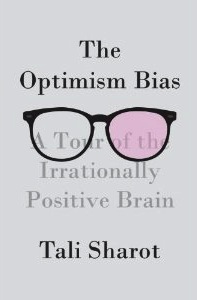What We're Reading Now
A Bias You Want
2 October 2011
In her review of all (or most) things happiness-related, Rachel read The Optimism Bias: A Tour of the Irrationally Positive Brain by Tali Sharot. Turns out a rosy outlook serves us well in more ways than one.
Tags: happiness, optimism, rachel read
I've been rightfully accused of being optimistic in nature. You might even call me a bit of a Pollyanna. So it probably comes as no surprise that I was hooked by the title of Sharot's recent book and the possibility that there might be some method to my glass-is-half-full ways.

The optimism bias is this: as humans, we're wired to see the bright side. As Sharot writes, "By definition, optimists are people who hold positive expectations of the future: They expect to do well in life, have good relationships and be productive, happy, and healthy." And a little dose of healthy optimism is a key ingredient to the perseverance that helps us make good decisions, plan ahead and wake up each morning ready to face the day.
The optimism bias relies on some quirks of human existence to survive. Unlike most animals, our minds move through time, and most all of us imagine a future that is rosier than actual experience would suggest. Our memories recapture emotion but are startlingly misleading about the facts. And we're predisposed to hope, even - and especially - when times are tough.
Now, if you're looking for a book to help you strengthen your optimism muscle, you should turn your attention somewhere else. (My suggestion at the moment would be The Happiness Project.) But if you're simply curious about things like the origins of hope, Sharot gives us interesting anecdotes and an accessible summary of recent research on the subject. I found my interest waning at times, but was reassured to learn that I'm likely among the 80% of humanity that is healthily optimistic. It seems that approximately 5% of us are optimistic to a fault and unable to react to the data that would deter them from foolish choices, and about 15% are pessimists.
From a Darwinian perspective, there are reasons for our optimism bias - not the least of which is a longer life expectancy. (It seems that pessimists tend to engage in more risk-taking behavior because they often feel they have less to lose. Riskier behavior leads to earlier death. Go figure.) From a human perspective, I'm glad to count myself among the postive-outlook crowd. If nothing else, life seems more fun with a rosier hue.
How does your outlook - positive or pessimistic - shape your view of things? Chime in with your comments.







Comments
Our Comment Policy:
Our blog posts are only half of the conversation. What our readers have to say is equally important to us, and we're grateful for all the comments that continue the dialog.
To ensure that the discussion here is as useful as possible to all of our readers, please be respectful of our contributors and refrain from harassing, threatening and/or vulgar language. We reserve the right to screen and remove any comments from the site. If you have a question about a comment or want to discuss our policy, please contact us. We'll talk it over.
Natalie Brown
Oct 11, 2011
I feel so validated. =D